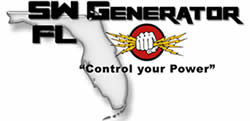The Disadvantages of a Portable Generator
Portable generators are a popular choice for providing backup power during outages, but they come with their own set of drawbacks. While they offer convenience and portability, it’s important to be aware of their limitations. SWFL Generator, specializing in Whole House Emergency Backup Generators, can help you explore better alternatives. For more information, visit swflgenerator.com or call (239) 222-1672.
Noise Pollution
One of the most significant disadvantages of portable generators is the noise they produce. Most portable generators generate between 60 to 80 decibels, equivalent to the noise level of a vacuum cleaner or a nearby highway. This constant noise can be disturbing to neighbors, wildlife, and may even violate noise ordinances in certain areas. If you live in a residential area, the noise from a portable generator can be a major inconvenience.
Low-Quality Power Output
Portable generators typically produce lower-quality power compared to permanently installed generators. This can cause issues with sensitive electronics, such as computers, televisions, and medical equipment, which may not function properly or could be damaged by the inconsistent power supply. For households that rely on high-quality power for their devices, a portable generator may not be the best option.
Regular Refueling
Portable generators run on gasoline, diesel, or propane, which means they require regular refueling. This can be inconvenient, especially during extended power outages when fuel may be in short supply. Additionally, storing large quantities of fuel can pose safety risks, such as fire hazards and exposure to harmful fumes.
Emissions and Environmental Impact
Portable generators emit harmful exhaust gases, including carbon monoxide, which can be dangerous if not properly ventilated.
- These emissions contribute to air pollution and can have negative health effects on people and the environment.
- In contrast, whole house emergency backup generators are often more environmentally friendly and produce fewer emissions.
Limited Power Capacity
Portable generators typically have a lower power capacity compared to permanently installed generators.
- They usually provide between 3kW to 10kW of power, which may not be sufficient to run all household appliances simultaneously.
- This limitation can be problematic during extended power outages when you need to power multiple devices.
Maintenance Requirements
Portable generators require regular maintenance to ensure they are in good working condition. This includes checking and changing the oil, replacing air filters, and ensuring the fuel system is clean. Neglecting maintenance can lead to mechanical failures and reduced efficiency, which can be inconvenient and costly to repair.
Security Concerns
Portable generators are more susceptible to theft due to their portability
- They can be easily moved and stolen, especially if left unattended in public or semi-public areas
- This risk can be mitigated by using security measures such as locks and alarms, but it remains a concern for many users.
Conclusion
While portable generators offer convenience and portability, there are several disadvantages to a portable generator that should be considered before making a purchase. Noise pollution, low-quality power output, regular refueling, emissions, limited power capacity, maintenance requirements, and security concerns are all factors that can impact their usability and effectiveness. For a more reliable and efficient solution, consider whole house emergency backup generators from SWFL Generator. They provide a more stable power supply, lower emissions, and enhanced security, making them a better choice for long-term backup power needs.
For more information on whole house emergency backup generators, visit swflgenerator.com or call (239) 222-1672.

